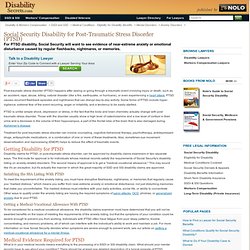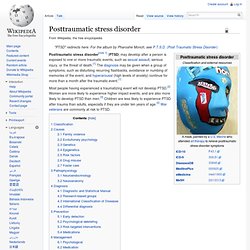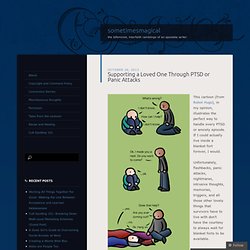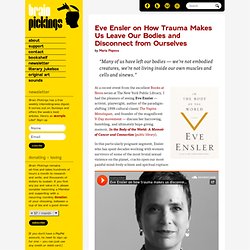

Social Security Disability for PTSD (Post-Traumatic Stress Disorder) Post-traumatic stress disorder (PTSD) happens after seeing or going through a traumatic event involving injury or death, such as an accident, rape, abuse, killing, natural disaster (like a fire, earthquake, or hurricane), or even experiencing a heart attack.

PTSD causes recurrent flashback episodes and nightmares that can disrupt day-to-day activity. Some forms of PTSD include hyper-vigilance, extreme fear of the event recurring, anger or irritability, and a tendency to be easily startled. PTSD is unlike simple shock, depression or stress, in the fact that the body and brain chemistry actually change with post traumatic stress disorder. Those with the disorder usually show a high level of catecholamine and a low level of cortisol in their urine and a decrease in the volume of their hippocampus, a part of the frontal lobe of the brain that is also damaged during Alzheimer's disease.
Getting Disability for PTSD Satisfying the SSA Listing With PTSD Medical Evidence Required for PTSD. Post-traumatic stress disorder (PTSD) Posttraumatic stress disorder. Posttraumatic stress disorder[note 1] (PTSD) may develop after a person is exposed to one or more traumatic events, such as sexual assault, serious injury, or the threat of death.[1] The diagnosis may be given when a group of symptoms, such as disturbing recurring flashbacks, avoidance or numbing of memories of the event, and hyperarousal (high levels of anxiety) continue for more than a month after the traumatic event.[1] Most people having experienced a traumatizing event will not develop PTSD.[2] Women are more likely to experience higher impact events, and are also more likely to develop PTSD than men.[3] Children are less likely to experience PTSD after trauma than adults, especially if they are under ten years of age.[2] War veterans are commonly at risk to PTSD.

Classification Posttraumatic stress disorder is classified as an anxiety disorder in the DSM iV; the characteristic symptoms are not present before exposure to the violently traumatic event. Causes Family violence Genetics. Supporting a Loved One Through PTSD or Panic Attacks. This cartoon (from Robot Hugs), in my opinion, illustrates the perfect way to handle every PTSD or anxiety episode.

If I could actually live inside a blanket fort forever, I would. Unfortunately, flashbacks, panic attacks, nightmares, intrusive thoughts, memories, triggers, and all those other lovely things that survivors have to live with don’t have the courtesy to always wait for blanket forts to be available. It’s scary for the person experiencing the attack, but it’s also scary for any loved ones who are trying to comfort and support someone through an attack. This post is for the supporters. Often in the midst of the episode, the distressed person doesn’t necessarily have their full vocabulary and can’t articulate exactly what they need in that moment. So how do you learn what is helpful? If you’re like my partner, mostly through trial and error. Safety Usually when someone is having an episode, they’re not actually in danger. Anchoring Touch (Use with extreme caution!) Recuperation. Eve Ensler on How Trauma Makes Us Leave Our Bodies and Disconnect from Ourselves.
By Maria Popova “Many of us have left our bodies — we’re not embodied creatures, we’re not living inside our own muscles and cells and sinews.”

At a recent event from the excellent Books at Noon series at The New York Public Library, I had the pleasure of seeing Eve Ensler — activist, playwright, author of the paradigm-shifting 1998 cultural classic The Vagina Monologues, and founder of the magnificent V-Day movement — discuss her harrowing, humbling, and ultimately hope-giving memoir, In the Body of the World: A Memoir of Cancer and Connection (public library).
In this particularly poignant segment, Ensler who has spent decades working with women survivors of some of the most brutal sexual violence on the planet, cracks open our most painful mind-body schism and spiritual rupture: I think — from my own life experience, and certainly what I’ve discovered in many women and men across the planet — is [that] when we’re traumatized, when we’re beaten, when we’re raped, we leave our bodies. Coping with PTSD.